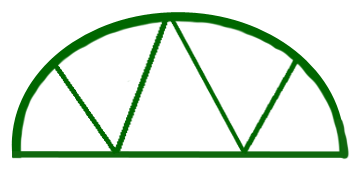Principles of Design
- balance
- symmetrical
- radial - around a central point
- asymmetrical
- color, shape, focus
- tense vs casual tones
- balance of interest - foreground vs background; big & small
- points of reference for size (or not)
- structure
- formal / informal
- visible / invisible
- interrelationships of forms - detachment, touching, overlapping, interpenetration, union, subtraction, intersection, scale, proportion
- proximity
- hierarchy, emphasis/subordination, focal point, center of interest, dominance
- repetition & rhythm
- recurring, repetitious, nonrandom variation
- keeps eye circulating
- architectural
- contrast
- anomaly, contrast, conflict, opposition
- unity
- cohesion, consistency, oneness, coherence, integration
- scale / proportion
- directional forces
- clarity, color, composition
Aesthetics
- line emphasis - contour, actual, implied ; horizontal = stability ; vertical = assertiveness ; diagonal = movement ; leading lines
- shape repetition - geometric : rectilinear (straight intersection), curvilinear (curving intersect); organic - biomorphic (resembling biological entity), amorphic (not derived from nature or geometry); positive (what you focus on) or negative (what’s left over)
- value - lightness / darkness ; hi key, low key; white ->pure hue->black ; complimentary color 1 -> dulled -> complimentary color 2 ; contrast - degree of difference between shades of gray; emphasis & subordination ; value more important than color ; high key = light value print ; low key = moody, dark value print
- texture - actual/tactile = rough, smooth, hard, sharp; visual - use line & color ; use side lighting to capture
- 4 layers of texture to be interesting
- color
- eye goes to lightest spot
- R-O-Y-G-B-Violet
- analogous colors - use one before and one after with primary color = harmonious
- complimentary - opposite colors on the color wheel - pop
- warm - moves toward you
- cold - recedes
- local color - under normal light
- optical color - perception of color
- soothing - monochrome, different shades of the same color
- color sense
- black - authority, grieving, serious, stable, strong
- white - purity, cleanliness, safety, neutrality, creativity
- gray - practicality, timeless, solid
- red - attention, movement, excitement, life
- pink - calming
- blue - calming, steadfastness, wisdom, loyalty, focus, too much = cold
- green - growth, nature, money, light green = calming, envy, good luck, generosity, fetility, peace, harmony, support
- yellow - cheerfulness, happiness, optimism (not too bright)
- orange - fun, happy, energetic, ambitious
- purple - wealth, prosperity, sophistication, mystery, wisdom, respect
- brown - reliability, stability, friendship, mourning=India
- color wheel:
- space
- point of view - worm’s eye view, bird’s eye view, fore shortening - distorted if object starts close and lays away
- fore shortening
- perspective
- figure-ground relationship
- foreground normally positive space, background generally negative space
- subtended angle - parallel parallel lines in distance don’t look parallel /
- angle/distance from subject to viewer
- thru texture gradients, brightness, color saturation, warm vs cool; overlapping = collage
- reflections in composition
- incongruent background
- fill the frame with subject
- rule of thirds - points of interest should be where lines intersect: divide frame into horizontal 1/3’s - top, middle, bottom; put horizon in top 1/3 for day shot unless sky is significant. Not in middle
- determine framing based on what’s going on in the edges, not what’s in the middle
- framing - camera tilt, shooting down, horizontal vs vertical
- slimming - shoot from above, neck out
- simplicity - single focal point
- incorporate depth - use angles and diagonal line, run eye across frame with diagonal line
- time & motion
- kinetic vs implied - viewer infers motion
- subjects entering photo with space in front of them, to indicate/show where they are going, leading space
Quality of Light
- diffused - no/soft shadows, low contrast
- direct - hard shadows, high contrast
- brightness - luminance values
- use multiple kinds of light
- high key - mostly light, low contrast, diffused
- low key - dark tones prominent, high contrast, edge lighting
- put sun in right or left, not center
- shine light through vase
- sun should be behind or on the side of photographer
- light & form unexpected intersection
Concepts to Depict
- perspective - have one
- focus on motivation, message
- ambiguity
- find your voice
- make art about what you know
- literal vs symbolic/figurative interpretations of a theme
- juxtaposition - one thing next to another suggests third thing
- metaphor - one thing makes you think of another
- synecdoche - part to whole relationship
- metonomy - associations are triggered
- meme - meanings and messages culturally transmitted over time, between generations
- how things look vs how things are
- displace an item/person in an environment that is opposite of their natural one
- challenge - find beauty in shot when subject is not
- environmental portrait - putting a person in context of their interests / job
- identity transfer into object
- symbolism
- meaning
- intention
- impact
- theme
- representation
- narrative
